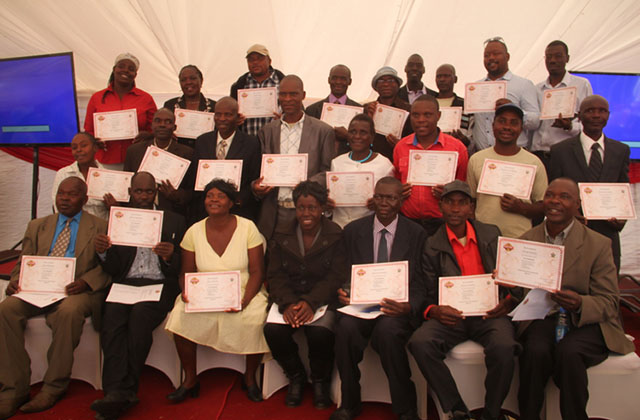More scrutiny needed on study choices

Leroy Dzenga Features Writer
With the changing times and shifts in technology, there is need to re-evaluate the importance of qualifications acquired in past years.
Back in the day, it was acceptable for a person to enrol at a college to study or take up a career in, lets say, typing — a person whose key role was to type handwritten articles into printable format.
Fast forward to 2017, the ability to type is no longer considered a significant skill even for primary school pupils. The same applies to the host of people who rushed to get International Computers Drivers’ Licence (ICDL) on the turn of the millennium.
Lucrative as it was at that time, the certificate now cannot be used to gain employment because of the demassification of technology, which has seen mobile phones perform the same functions as computers.
Information Communication Technology (ICT) ranks among the most affected fraternities where, unlike in previous years, some qualifications are now close to irrelevant. Government is not oblivious to the change in trends and there are plans to make suitable adjustments.
Dr Godfrey Gandawa, the Deputy Minister in the Ministry of Higher and Tertiary Education, Science and Technology Development reckons that it is futile to resist the winds of change.
“The trends of what is happening with the advent of technology is that certain jobs and industries will die,” he said. “Our people must adapt to the new programmes that are technologically compliant.”
It is with this reality in mind that the ministry has been spear heading their Science, Technology, Engineering and Mathematics (STEM) plan.
“People may hear STEM and think that we are just politicking, but the idea is that we are supposed to produce competitive graduates at the end of the day,” he said. “Institutions should be technologically compliant.”
Most short programmes have been overtaken by trends and changes where pursuing them may not have intended results.
“In fraternities like management training, you will see that there are courses like Human Resources which are now modules in some university programmes,” Dr Gandawa said.
A change in approach is long overdue.
“Technology and trends are moving fast,” he said. “If we don’t allow our tertiary education programmes to be technologically compliant by four years, we will produce irrelevant graduates.”
There is a possibility of a statutory intervention to prevent students and their families from directing their resources to less profitable ends. “We are engaging as we come up with a new law that will regulate some programmes in some colleges to ensure that our graduates remain relevant in the modern world,” he said.
Seemingly, institutions have to be creative if they are to keep getting students whose needs maybe more than the “courses” being offered.
Senior Lecturer at the University of Zimbabwe’s Department of Technical Education, Dr Peter Kwaira, said people were failing to make rational decisions because of an obsession with qualifications.
“Back in the 1970s, Ronal Dore wrote a book saying most African countries suffer from what is known as the diploma-disease,” he said. “Most people feel they should get a paper qualification, just for the sake of getting it.” Certificates that have little or no weight on the job market continue to be parcelled out much to the detriment of students and their financers.
“When a person gets a certificate from a college in town, they may get a job depending on who is employing who, but going for a more credible qualification always works better,” he said.
Dr Kwaira said there is now more to efficiency than one’s paper cabinet. “It is no longer enough to be called a doctor or a professor,” he said. “What is important is what can you do, how functional are you?”
People should verify if the qualifications they are pursuing are still within the preferences of the industries they intend to enter.
In Zimbabwe, there is a regulatory authority that oversees what students in tertiary institutions are being taught, however, their jurisdiction does not freely extend to private colleges.
“There is the Zimbabwe Council for Higher Education (ZIMCHE), a body that checks what students are being taught across universities.
“They ensure that students get from polytechnics and universities are at par with world standards qualifications,” Dr Kwaira said.
Training institutions should work in close consultation with industrialists to ensure that the labour they produce fits expected standards.
“There has to be external engagement with industry so that students do not waste four years in college to come out with qualifications that do not meet standards,” he said.
Dr Kwaira warned against dubious colleges that offer certificates not backed up by a recognised examination body.
“Some colleges are being run from a briefcase, if they award you with a qualification unless if its authenticated by a respected body, it may just be a printed paper.”
Efforts are being made to ensure competent academic products are produced in Zimbabwe.
“The new curriculum is a national effort to keep abreast with trends,” said Dr Kwaira. “We have to make sure we don’t lag behind, you can’t rest on your laurels as a country especially with the way things are changing,” he said.
Dr Kwaira added; “This curriculum we are praising as new may need to be re-evaluated if a drastic change in trend happens, so there is need for quick solution based education skills now.”
Globally, emphasis has been placed on the importance of making well thought out decisions in career choices and the route taken towards that particular end. The 2016 World Economic Forum Global Challenge Insight Report titled “The Future of Jobs” focused on the changes that will befall the global workforce in years to come.
It said the current changes creates an opportunity for those who anticipate change and spells doom for slow reactors.
“Recent discussions about the employment impact of disruptive change have often been polarised between those who foresee limitless opportunities in newly emerging job categories and prospects that improve workers’ productivity and liberate them from routine work, and those that foresee massive labour substitution and displacement of jobs,” read part of the report.
The report suggests equipping students with qualifications that ensures their importance in the future.
“Without urgent and targeted action today to manage the near-term transition and build a workforce with future proof skills, governments will have to cope with ever-growing unemployment and inequality, and businesses with a shrinking consumer base,” the report said.
According to the report, there will be more opportunities in fields like Business and Financial Operations, Management, Computer and Mathematical, Architecture and Engineering, Sales, as well as Education and Training.
Opportunities are expected to dwindle in fraternities like Office and Administrative, Manufacturing and Production, Construction and Extraction, Arts, Design, Entertainment, Sports and Media, Legal as well as Installation and Maintenance.
These projections mean that a more informed approach works better in making career choices and deciding which qualifications to pursue. It may not be too wise to pursue a profession whose personnel are already being replaced by a computer programme or machine.
Feedback: [email protected]








Comments